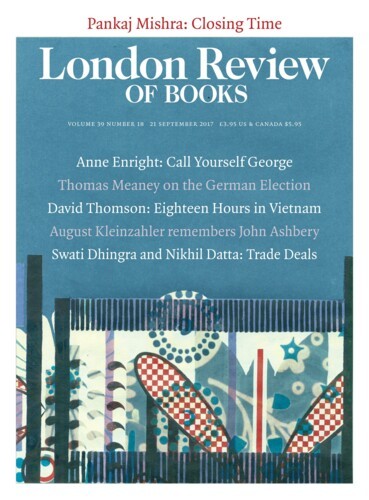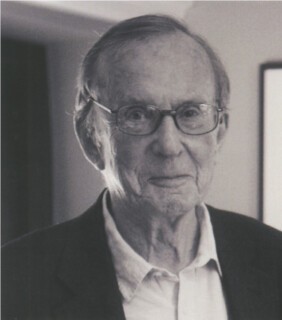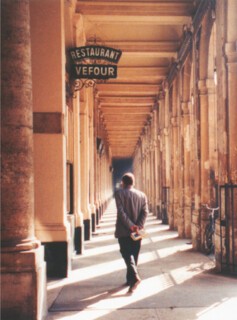It was John who had the idea that I should say something about his professional life at his funeral. It was a very nice idea and I’m glad – not to say flattered – that he had it. But I found it a spookily hard thing to do. ‘Spooky’ because every time I thought I had a point to make I heard myself checking it with John – ‘Is that right?’ ‘Can I say that?’ ‘Does that make sense?’ – and then I began to understand what had happened to all of us.
I first heard of John in the late 1960s when I was working at Faber and we were thinking whether or not to publish a translation of one of Alejo Carpentier’s magical realist novels. My boss told me to get in touch with someone called John Sturrock, who worked at the TLS and knew Spanish and knew about magical realism; he would advise us. I think John said we should and I know we decided not to. Faber was quite stick in the mud in those days.
John was not that at all. His good fortune, he wrote in The View from Paris, his collection of essays on postwar French intellectuals, was to have entered on his professional life in the mid-1960s when Sartre was ceding the territory to Roland Barthes; when, as John put it, ‘the first rustlings of Literary Theory’ – he gave it capital letters – ‘were to be heard’, and the quarrel between those who took to theory and those who took against it was just starting up. John had no doubts about which side he was on – I’m not sure he ever had doubts: he had questions – and the argument for theory was all the more enjoyable (his word) because it had to be made, as he described it, in a country such as Britain, ‘so gruffly unreceptive to anything even faintly theoretical’; or foreign.
John’s working life divides easily: a little more than thirty years on the TLS, a little less than thirty years on the LRB. I’m probably projecting more than I should when I say that he was known and admired among his colleagues above all for two things: the severity of his judgment and the playfulness of his intellect, and I can’t think of a more likeable combination. Sadly, it’s a combination one is more likely to find on the political right, in the Spectator, for example. John’s version was staunchly of the left. Not the wild left or the utopian left so much as the dissenting left; or the left it’s a pleasure to read. Here he is, in August 2003, on one minor aspect of the war in Iraq:
The delusional cast of mind of those who ordered our armed services into action on a false prospectus appears to be spreading, no doubt being seen in high places as a sound qualification for anyone who may now be angling to land a job sorting things out in Iraq itself. The man who has been put in charge of a body called the Iraq Industry Working Group was quoted last week as saying that within quite a short time – as little as three years, he thought – Iraq could be turned from the unhappy scene of murderous disorder and deprivation it currently is into a tourist venue, containing … such recently overlooked destinations as the ‘birthplace of Abraham’ and the Hanging Gardens of Babylon, even if these particular sites might need a spot of making over by the people you see on television doing that sort of thing in the English suburbs. Why, on the other hand, wait even three years to open the country up to tourists, when you could start easyJetting them in straight away and offer them their own weight in air miles if they manage while they’re there to do what no one else has done and finger the missing weapons.
The LRB piece that caused the most hoo-ha among the paper’s readers, and elicited the largest number of indignant letters, was written by John. Alan Sokal, a professor of mathematics at UCL and physics at NYU, had gone into battle against the postmodern theorists whom he accused – I’m simplifying but not greatly – of having no understanding of the concepts they borrowed from science, and no respect for truth either. John’s response was to call Sokal a ‘bigot’; far better, he said, ‘wild and contentious theses’ than the ‘stultifying rigour’ which Sokal ‘inappropriately’ demanded. Rigour of course has its place. John himself was rigorous and often demanded more rigour from others. But unlike any editor I’ve known, he saw it as his obligation to ‘encourage adventurism in ideas as the way to keep the intellectual pot boiling’.
In fact there was a great deal that John favoured which conventional wisdom disapproves of: ambiguity is one, contradiction another. He did a good line in oxymorons. Who else would have found Céline’s sarcasm ‘refreshing’? How often was Michel Houellebecq’s first novel, Whatever, praised for being ‘impressively bleak’, and his next for being ‘boldly out of tune with the times’? Would anyone else have thought to describe the Dreyfus Affair as ‘that inspirational episode of injustice’, though it plainly has been precisely that. Only a very few occasions allowed John to lower his guard. The death in Auschwitz of Georges Perec’s mother elicits a hint of sentimentality, but time spent in the Gulag is no excuse for sloppy thinking and, as John puts it, Andrei Sakharov’s discussion of Derrida isn’t ‘guaranteed to be totally coherent by his courage in resisting persecution’. John was a keen if disappointed follower of the British political scene; after Blair’s speech in Sedgefield announcing his intention to step down, John described him as ‘our first ever ex-prime minister in waiting’. He had played, and liked to write about cricket, and welcomed its ‘benign colonisation of English summers’. Yet his writing is all of a piece: his thoughts, his sentences, the words that he chooses follow a route of their own. One thing the TLS and the LRB have in common is the trace left by his headings: ‘Feuds Corner’ for a review of a novel about Albania; ‘Dr Livingstone, I infer’ for Jerry Fodor’s sense of what Stanley might have been thinking; ‘Springtime for Robespierre’ for Hilary Mantel’s piece on the French Revolution.
I didn’t meet John in person until I went to work at the TLS in 1974, a few years before Murdoch acquired the paper. John was the deputy editor, John Gross was the editor. Gross referred to John as the ‘sea-green incorruptible’ and you get the picture; it wasn’t a happy place to work in those days, though the friction between the two principals – the severity of one and the worldliness of the other – worked to the benefit of the paper. John was definitely happier at the LRB – you could see it on his face – but then no one minds being treated like a sage.
I haven’t spoken about aspects of John’s professional life that I should have spoken about: his translations – Stendhal, Victor Hugo, Proust, Georges Perec and several others. Or his books: on structuralism, on autobiography; the guide to the Pyrenees. But then he hasn’t been there to advise me.
Letters
I was very sad to learn of John’s passing. The loss of another link with Oxford days. Although we were both at Lincoln our paths mainly crossed in talk at dinner – he was a linguist and I an agronomist, however we did both defend the college’s reputation on the hockey field, he as a skilful centre half and I as a pedestrian fullback (I expect the terminology is quite different now). But it was later that we came together more, because in 1955 (I think) he and Charles Hodgkinson (sadly gone from us) and I shared a very comfortable flat on the top floor of a house in Chalk Farm owned by an editor of the Times. John I recall as an account executive in some advertising agency which seemed to allow him ample time to go shopping. Charles and I were having to work much longer hours. John would arrive home and have supper organised and beautifully cooked – he was a very accomplished cook and we, Charles and I, became very accomplished at washing up! Happy days together broken by my getting married in later 1956 (and still getting cooked for). John had a marvellously dry sense of humour and always a pithy comment, ever an academic.
Nigel Bell
John and I had worked together, off and on, for I suppose more than twenty years both at the TLS and the LRB and I grew to admire him hugely for his learning, wit and humour. First I was his editor and then he was my editor and I enjoyed both relationships, and both papers benefited so much from all that he brought to them. I loved the drawl and chuckle with which he would cut down some overmighty academic to size and his countervailing enthusiasm for writers who were not well known or had fallen out of fashion. When I arrived at the TLS from the rougher world of political journalism, I was so grateful for all the help he gave me and it is so sad to think that I shall never hear his confidential voice over the telephone again.
Ferdinand Mount
I joined the TLS straight out of university in the 1990s, so only overlapped briefly with John, but he left a very deep impression on me, as he did on all who were lucky enough to meet him and work with him. When he decided to move to the LRB, I was one of several deputed to take up a part of his role at our paper – the editor correctly assuming that one person wouldn’t be able to do all that John had taken in his stride for so many years. He very generously compiled an annotated list of likely reviewers of history books, which I took as my bible for years. I have it in front of me now, dog-eared with over-use, but it reminds me that, even in pretty sober documents like this, flashes of John’s wit pierced through. One contributor is ‘eccentric’, another ‘abrasive’, a third (John didn’t know that this one had been my tutor) ‘weighty’. I remember puzzling over the apparent instruction by one man’s name, ‘Peel. Now old’, until I realised that the first word referred to a biographical subject – but I rather suspected that John had meant for the note to raise a smile. We would often cross paths at literary events, and he was always ready with the smiling inquiry about his old paper: ‘How are you all getting on?’
David Horspool
I did not know John well personally but I did know him as an editor of great distinction. He brought out the best in me. His wit and taste and high standards made me better than I am. I am grateful to him and mourn his death.
Thomas Laqueur
John was one of my oldest friends, indeed I can’t think of any older. We met very soon after our simultaneous arrival at Lincoln College in 1951. There he introduced me to the Ximenes crossword competition in the Observer: he was something of an aficionado even then, and went on to be a regular solver and occasional winner of the Listener puzzles; a premonition of a literary career was his entertainment for the JCR, ‘The Murders in the Rue Barbe’, some way sub-Simenon, it has to be admitted. In 1956 I moved into the Hampstead flat where he was already living. That was when he was working as an advertising copywriter: he was particularly pleased by his slogan for a towel rental company: ‘You’d think they’d be using Towelmaster by now.’ Other memories are of his passionate denunciation of the Suez campaign and, more happily, of his introducing me to Anthony Powell’s Dance to the Music of Time, to which I keep returning.
Later he lived in the house on Windmill Hill in Camden that belonged to my cousin, John Willett, who became deputy editor of the TLS and was doubtless responsible for John working there.
George Willett
Friendships are a kind of conspiracy between like minded people against what the rest of the world thinks and I was lucky enough to have John as a fellow conspirator for over fifty years. I knew that we would be friends from the moment he pulled a face as he sipped the first (and last) cup of Nescafé we ever gave him. ‘Oh dear’, my wife said. ‘Is the milk off?’ ‘No, no,’ said John. ‘But you did invite me to coffee.’
We quit teaching on the same day, both of us square pegs in round holes. Thereafter we met occasionally to drink expensive red wine and eat cheap pasta within a stone’s throw of the LRB offices, and when he was translating Volume Four of In Search of Lost Time for Penguin, he called on us in Cambridge. A colleague luckily asked me exactly the right question, ‘And what brought John Sturrock to your house?’, enabling me to reply: ‘Sodom and Gomorrah.’
I admired John hugely. I liked everything about him, his sense of humour, the way he deflated the pompous and challenged the entitled. He was such a talented man, such a good friend, and I am so sad that we can have no more harrumphs together.
Bob Finch
John was a serious influence on so many; less, I’d say, on beliefs than in the rigour and clarity of expression he expected of each of us. We had been friends since early 1958, sharing an office in our Mayfair advertising agency, before he took himself off to Hurtspierpoint to teach French. Never out of touch, he always stayed with me when in town. We shared a villa in Majorca one year, rented from his perceptive friend Polimani, who nicknamed John ‘Ming’ believing him to possess an unknowable or mysterious nature beneath the linguistically-polished, attractive surface we all admired. Much of his restraint was in fact simple shyness, partially shed over the years. When I quit agency life to freelance in 1963 we travelled to the US, lugging portable typewriters and writing a wishful TV sitcom script for Hancock. Though we shared much, I never, over almost sixty years, found John less than a natural contrarian. John’s singular tangle of quirks, drives and lowland Scottish cautions produced someone totally fearless in thought, argument and debate.
Séan Gallagher
I didn’t know John very well though I met him a long time ago because I reviewed French books for the TLS when I first began. I always admired him and learned so much from him, and felt so braced by his curiosity and defence of the Theorists. He had such a quizzical, witty expressive face, too.
Marina Warner
Send Letters To:
The Editor
London Review of Books,
28 Little Russell Street
London, WC1A 2HN
letters@lrb.co.uk
Please include name, address, and a telephone number.



